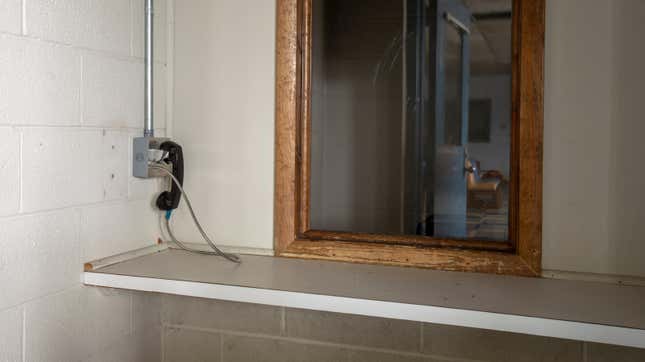
Two lawsuits filed by an activist organization allege a conspiracy between county governments in Michigan and prison phone companies. This conspiracy has involved a “quid pro quo kickback scheme” that eliminated in-person visits at prisons to boost profits for the companies, the litigation claims. As part of the scheme, a portion of those profits were allegedly then shared with the county governments.
The Civil Rights Corps, a non-profit that describes itself as “dedicated to challenging systemic injustice in the United States’ legal system,” recently filed the two lawsuits, which allege a similar scheme in both St. Clair and Genesee counties in Michigan. These arrangements involved business relationships with the county sheriffs of St. Clair and Genesee that were predicated on the elimination of in-person prison visits. Under the new systems, visitors to the jails had to pay for phone calls with the incarcerated, and the money from those calls was then shared between the providers and the counties, the lawsuit alleges.
For instance, in the case of the St. Clair lawsuit—which lists as defendants St. Clair Sheriff Mat King, St. Clair County, prison phone company Securus, and others related to the deals—the litigants claim:
On September 22, 2017, St. Clair County officials decided to implement a new policy: a Family Visitation Ban prohibiting people from visiting their family members detained inside the county jail...The County’s decision was part of a quid pro quo kickback scheme with Securus Technologies, a for-profit company that contracts with jails to charge the families of incarcerated persons exorbitant rates to communicate with one another through “services” such as low-quality phone and video calls. The County officials agreed to prohibit in-person visits at the jail in exchange for a substantial cut of Securus’s future revenue.
In the case of Genesee County, meanwhile, the litigation makes a similar argument. It claims that Genesee again colluded with Securus to end family in-person visitations at the county jails:
On September 22, 2014, Genesee County officials enacted a new policy: a Family Visitation Ban prohibiting people from visiting their family members detained inside the county jail...The County’s initial decision in 2014 was part of a quid pro quo kickback scheme with Securus Technologie...
However, Genesee later switched providers from Securus to a different phone provider, a company that was then called Global Tel*Link Corporation (GTL), but later changed its name to ViaPath. The deal again centered around extracting money from the paid phone calls that visitors had to make to communicate with people incarcerated at the jails, and sharing the profits between the government and the company:
At then-Undersheriff (now-Sheriff) Christopher Swanson’s direction, in 2018, the jail’s captain told an account executive for Global Tel*Link Corporation (GTL)—the other major jail telecommunication company in the country—that the County Defendants wanted to make more money from phone and video calls than the cash-incentive arrangement with Securus: “We need the best deal you can do,” he wrote. And he got it.
The County Defendants switched providers for the jail, negotiating and then signing a contract with GTL in 2018. Under that contract, which remains in effect, GTL pays the County Defendants $180,000 per year from the company’s phone call revenue, an annual cash payment called a “technology grant” of $60,000, and 20% of the cost of every video call (the contract priced video calls at: $10.00 for 25 minutes). GTL projected that the County would receive another $16,000 per year from its cut of the video call revenue alone.
Cody Cutting, an attorney with Civil Rights Corps, told the Detroit Free Press: “These cases demand urgent action from the courts because children are suffering. Every day these children and parents remain separated adds to their pain. But the cases also pose a broader question: Do we as a public condone a criminal system so unmoored from any moral bearings that it supports the punishment and exploitation of children, families, and communities?”
ViaPath, which was previously called GTL, told the New York Times that the company “denies the allegations in the complaint and looks forward to the opportunity to defend the claims made against it.”
Securus Technologies, meanwhile, told Ars Technica that the case was “misguided and without merit. We look forward to defending ourselves, and we will not let this suit detract from our successful efforts to create meaningful and positive outcomes for the consumers we serve.”
Gizmodo reached out to ViaPath and Securus, as well as the St. Clair and Genesee county sheriff’s offices. We will update this story when they respond.